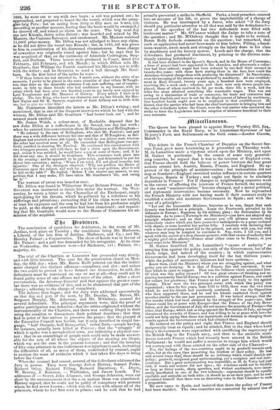Vat Wrobinces.
The nomination of candidates for Ashburton, in the room of Mr. Jardine, took place on Tuesday ; the candidates being Mr. Matheson, a Liberal, of the late firm of Jardine, Matheson, and Co. ; and Mr. Horsley Palmer ; a Conservative. The show of hands was in favour of Mr. Palmer : and a poll was demanded for his antagonist. At its close on Wednesday, the numbers were—for Matheson, 141; Palmer, 96; majority, 45.
The trial of the Chartists at Lancaster has proceeded very slowly, and with little interest. The case for the prosecution closed on Mon- day, the fifth day ; when Mr. Baron Rolfe pointed out that the indict- ment charged two distinct offences—conspiracy and riot : and unless the two could be proved to have formed one transaction, he said, the defendants must be convicted on one or not at all—they could not be found guilty some of one offence and some of the other. After a short conversation, the Attorney-General said that against the greater num- ber there was no evidence of riot, and so he abandoned that part of the charge ; adhering to the charge of conspiracy.
The defence then began ; and the Jury were addressed successively on that day and part of the next, by Mr. Dundas, Mr. Baines, Mr. Sergeant Murphy, Mr. Atherton, and Mr. M-Oubrey, counsel for several defendants. The principal arguments were, that the proof of active participation was defective ; that the strike originated without the instrumentality of the Chartists, and there was nothing illegal in their using the occasion to disseminate their political doctrines ; that they bad in point of fact striven to preserve the peace ; that the placard of the Executive Council was foolish, but it only described in turgid lan- guage, "half Ossianic, half Bonapartist," actual facts,—people having, for instance, actually been killed at Preston ; that the " struggle" of which it spoke was a metaphorical term, not indicating a physical con- test ; that in an assemblage of people each could only be made answer- able for the acts of all where the objects of the meeting are illegal, which wa3 not the case in the present instance ; and that the lumping of fifty-nine prisoners in one indictment was injurious to each, increasing the difficulties of all, as many of them, undefended by counsel, ought to analyse the mass of evidence which it had taken five days to bring before the Court.
When the counsel had ceased, several of the defendants addressed the Jury in person. They were George Julian Harney, Samuel Parks, Richard Otley, Richard Pilling, Bernard Macartney, C. Doyle, W. Beesley, J. Bairstow, Wolfenden, and James Leech. The addresses of — Storer, John Allanson, and George Johnston, were cut short by the announcement that the c.ise against them was abandoned. Harney argued, that he could not be guilty of conspiracy with persons whom he had never known ; which was the case with almost all of the prisoners, whom he had first seen in prison ; and he said that he had
actually prevented a strike in Sheffield. Parks, a local preacher, entered into an account of his life, to prove the improbability of a charge of violence. He was interrupted by a Juror, who asked "if the Jury should pay particular attention to all that was said by the defendants ?— most of the speeches of the last two defendants were filled with irrelevant matter." Mr. O'Connor wished the Judge to take a note of the question ; and Mr. M'Clabrey thought that it ought to be noticed. Baron Rolfe forbade comments on the question ; but remarked, that such an application had never been made to him before. Pilling, a hand- loom-weaver, dwelt much and strongly on the injury done to his class by machinery and the factory system. Leech met the charge, that the defendants had produced discontent, by pointing to the distress noto- riously existing beforehand— It had been declared in the Queen's Speech, and in the House of Commons ; a form of prayer had been appointed in the churches, and afterwards a collec- tion had been ordered; wages had been reduced by one-half their amount in twenty-five years : with those facts staring them in the face, how could the Attorney-General charge them with producing the discontent? In Manchester, even the sweeping of the streets was performed by machinery. At one establish- ment in Bury Ground, twenty years ago, a hundred men were employed, receiving 30s. a week each ; whereas, now there were only eleven people em- ployed, three of whom received 3s. 6d. per week, three 10s. a week, and the other five alone obtained something like reasonable wages. This was not owing to a diminution of trade or commerce, for trade and commerce had increased fourfold, aud were it not for the displacement of labour by machinery, four hundred hands ought now to be employed in that establishment. He hinted, that the parties who had been the chief instruments in bringing him and the other defendants before the Court, were the real parties who concocted the strike to force the Legislature into the adoption of measures beneficial to their own interests.


























 Previous page
Previous page